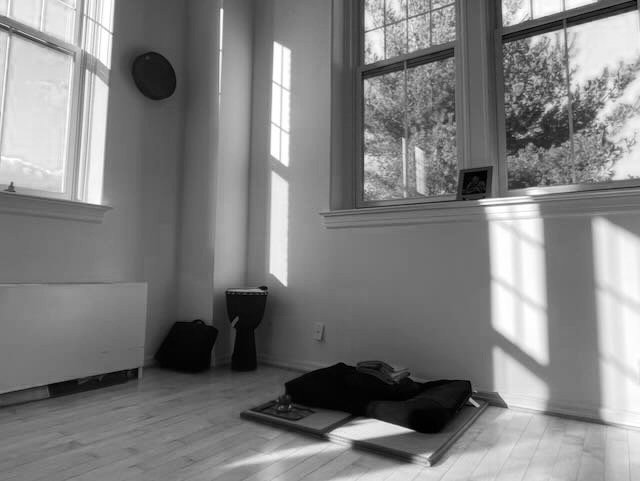A Hall of Great Vessels: Summary of November 2022 Mini-Retreat
On Shabbat afternoon a group convened online for a mini-retreat, dedicated to silent meditation, niggunim / hassidic contemplative melodies, art practice and council practice. It was the first public offering I broadcasted from my new basecamp in Peekskill, NY, which I amusingly referred to as my Yiddishkeit Zen Cloister. It was a clear, yet windy, day. The large pine tree was swaying outside my window as we gathered our attention.
In giving the opening guiding words, I referred to a teaching from the Rav Kook, an early 20th century rabbi, from his stunningly non-dual commentary essay Olat Re'a'yah, a commentary on the morning gratitude prayer Modeh Ani. In one section he focuses on the word kayam:
אמנם החיים אינם מצטיירים לנו כ"א ע"י המון שינוייהם, ואנו מתעלים לההכרה וההרגשה העליונה של מכון החיים של האורה האלהית, שתואר החיים ותואר הקיימיות מתאחדים בו.
in which he acknowledges (I paraphrase,) the constant flow of change that makes up our human life, and that this Kayam, which literally translates to exists, or sustained, is something that is ever present, never changing, and is in fact, the source of all life, where all is unified. In meditation, we practice just that - returning to this component of our experience, awareness; we develop our conviction in it as the ground for our lives; we study - become intimate with - the content of our mind; and let it all be, unified and merged into a simple state of being.
The day featured two niggunim / hassidic melodies:
- Niggun Bnei Heikhala - translated to ‘People of the Great Hall,’ or alternately, ‘Those in Possession of Great Vessels,’ is the melody I used to open our day is attributed to either "Maggid of Zlotchev," Rabbi Yekhiel Michal of Zlotchev or his contemporary -- the Baal Shem Tov. Their predecessor Isaac ben Solomon Luria Ashkenazi, aka Ariza"l, composed an Aramaic incantation that this melody was attached to. It invites the ancestors & Atik Yomin - the Ancient of Days, to join the hall of Presence. The Niggun has been intended for the third meal, Seudah Shlishit, which is the hours before Shabbat exits, a time dedicated to contemplating yearning. It is Niggun #10 in the Chabbad Niggunim book. Link to Hebrew wiki page with , A recording by Rabbi Yair Kaleb of Israel.
Translation:
Descendents of the Great Hall, yearning to see the light of the Nuanced Faced (Hebrew: Za’ir Anifin);
Be Present here at this table, by which Agency is drunk;
They coveted this gathering, among winged messengers;
They rejoiced now in this time, that has no volition, greed or anger;
Come close to me, see Life!
No decrees are too harsh;
the crude dogs do not enter;
Here I summon the Ancient of Days for the midday prayer, until they leave;
It revealed its purpose - to nullify all forms/facades,
Place them in their caves, stowed away behind boulders;
because now, in the midday prayer, it is the joy of the Nuanced Face,
- Niggun l'Aharon Haritonov - The melody we used for the art practice and throughout the day. R. Aharon H. was a shokhet, a rabbi, and student & contemporary of R. Shmuel Schneersohn. His prolific family has composed several melodies in the Chabbad niggunim book. Also used at Shabbat. Niggun #69. A recording by Rabbi Yair Kaleb
I add some context to these melodies, because I drive a sense of connection to my ancestors, knowing our bodies reverberate with the same series of frequencies, replenishing their momentum, and sending them off onward, into the universe, today.
Because of the limitations of Zoom, I performed this last niggun and let the participants use artisitic expression to relate to their experience, at this moment, held by this awarness they cultivated. As I strummed and later drummed, each one had time to spend intimate time to bear witness with the content of their life, their own creation.
We concluded with several rounds of Way of Council practice, a form of social-relatable meditation, where unlike in silent meditation, here the silence is voluntary, and one is encouraged to speak from the heart without debate. Council practice is a unique way to bridge the silence of radical interiority of meditation, with being and relating with others. The hall of presence itself was the receiver of the words people conjured: gentleness, anxiety, mourning of a parent, and the pleasure in shared presence.
The melody of Rabbi Aharon Haritonov accompanied us into Shabbat afternoon.

